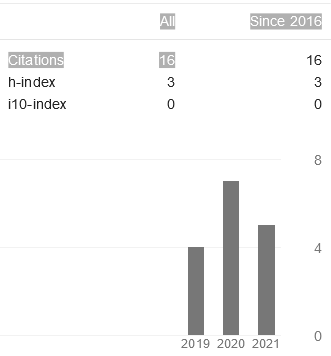Mindfulness Training to Reduce Ego Depletion in College Students: A Quasi Experimental Study
Abstract
Ego depletion is a condition where individuals experience a setback in self-control and daily activities. The aim of the intervention was to determine the effectiveness of mindfulness training in reducing ego depletion in 6th semester students. There were 60 participants divided into the experimental group (N=30) and the control group (N=30). Mindfulness training in this study consisted of five sessions. The design of the study was an untreated control group design with dependent pretest and posttest samples. Data analysis used descriptive statistical techniques with quantitative and qualitative tables. The ego depletion research instrument uses an adaptation scale totaling 15 items of physical, mental and emotional exhaustion. The results showed that there were significant differences in the experimental group and the control group. This proves that mindfulness is proven to reduce student ego depletion
Copyright (c) 2023 Erina Dwi Agustin, RIzky Melania Agustin, Dewi Sakhsiyatul Izzati, Alfa Nadya Nisma Salsabila, Dimas Firman Ananda, Suryani

This work is licensed under a Creative Commons Attribution-ShareAlike 4.0 International License.
Authors who publish with us agree to the following terms:
- Authors retain copyright and grant the publisher right of first publication with the work simultaneously licensed under a Creative Commons Attribution License that allows others to share the work with an acknowledgement of the work's authorship and initial publication in this proceeding.
- Authors are able to enter into separate, additional contractual arrangements for the non-exclusive distribution of the proceeding's published version of the work (e.g., post it to an institutional repository or publish it in a book), with an acknowledgement of its initial publication in this proceeding.
- Authors are permitted and encouraged to post their work online (e.g., in institutional repositories, pre-prints sites or on their website) prior to and during the submission process, as it can lead to productive exchanges, as well as earlier and greater dissemination of published work





_page-00011.jpg)
